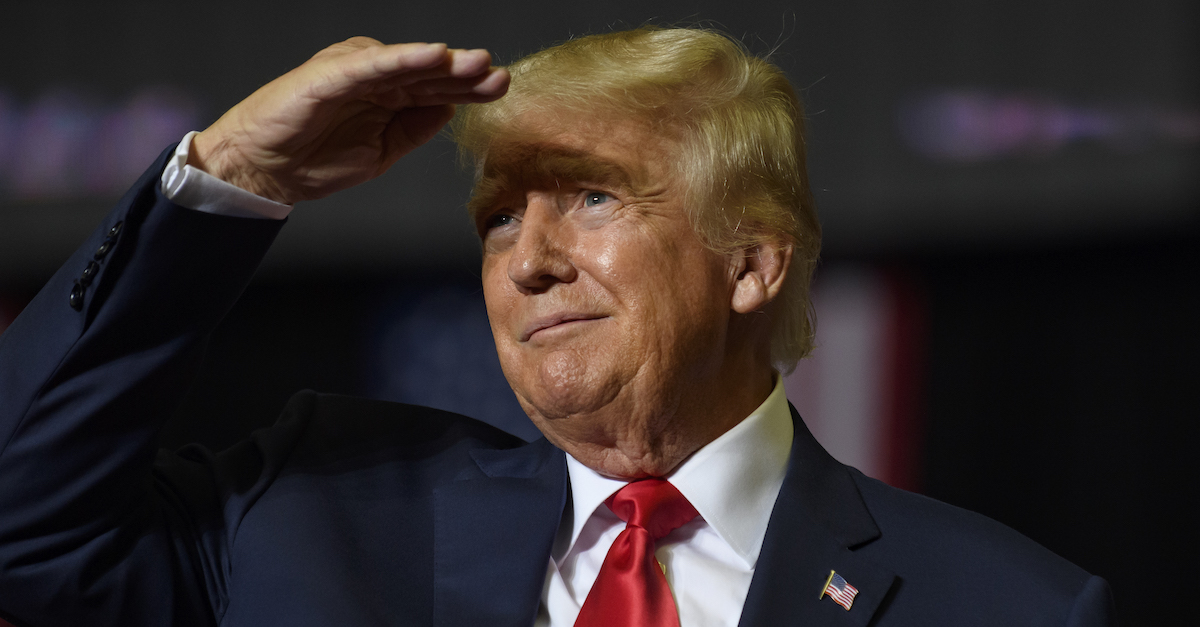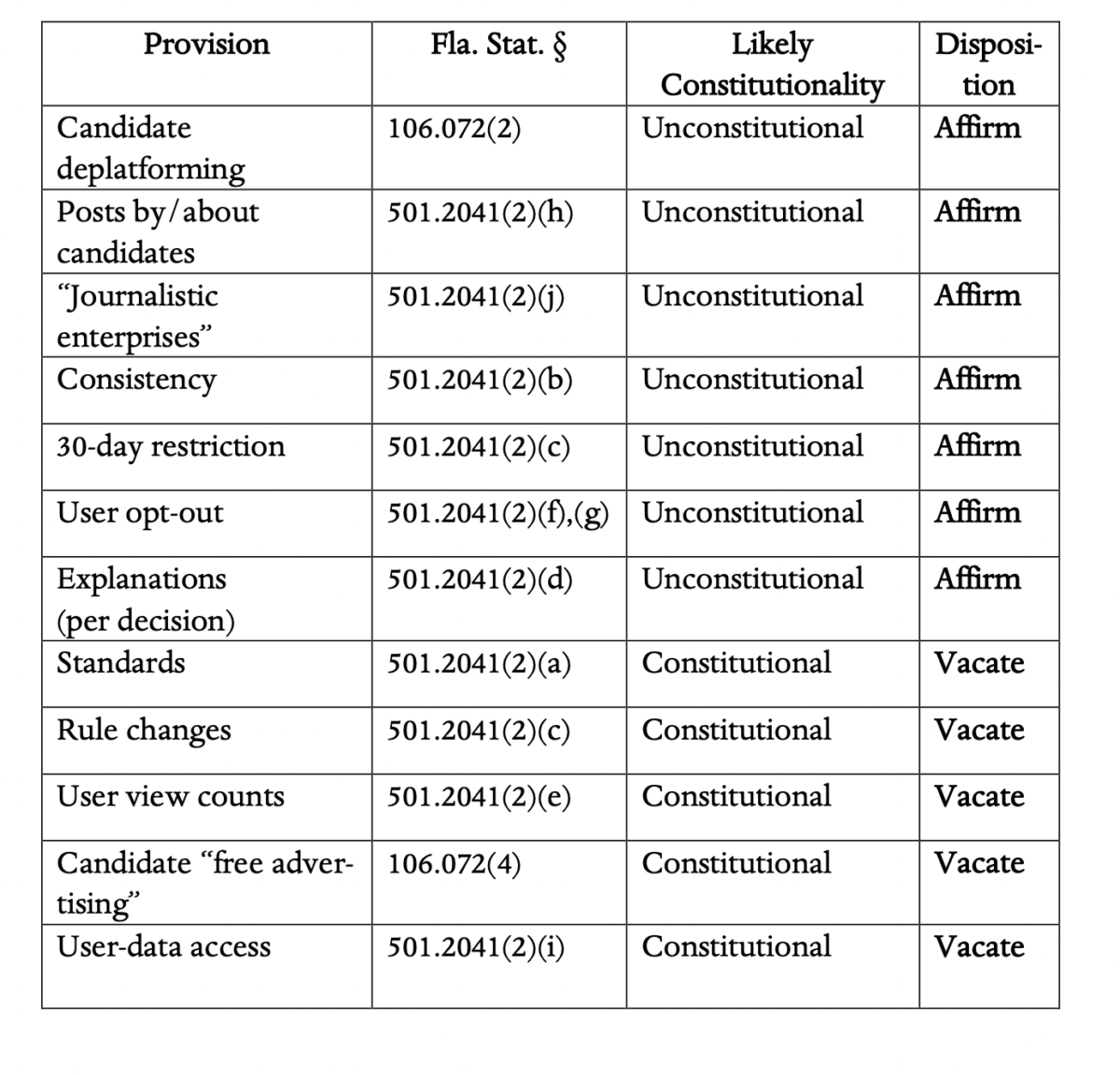
Former President Donald Trump was photographed speaking at a rally on Sept. 17, 2022 in Youngstown, Ohio. (Photo by Jeff Swensen/Getty Images.)
Former President Donald Trump continued his longstanding quest to undo Section 230 and deal a blow to Big Tech immunity in the form of an amicus brief Friday, supporting Florida’s parallel efforts at the U.S. Supreme Court.
Trump, who was infamously banned from Twitter in the aftermath of the Jan. 6 attack on the Capitol, urged the justices to find in favor of Florida Attorney General Ashley Moody (R) and support a state law barring social media platforms from banning political candidates, among other provisions.
One of the lawyers on the brief is with the America First Policy Institute, whose higher-ups include Linda McMahon, Larry Kudlow, Chad Wolf, Brooke Rollins, and more.
As Law&Crime reported in May 2021, NetChoice LLC sued on First Amendment grounds over Florida Republican Gov. Ron DeSantis-backed bill to penalize social media platforms for “censoring” political candidates. The trade organization plaintiffs argued that in reality such a law was unconstitutionally designed to punish private actor platforms for the content moderation decisions they are empowered by Section 230 and the First Amendment to make.
“The Act discriminates against and infringes the First Amendment rights of these targeted companies, which include Plaintiffs’ members, by compelling them to host — and punishing them for taking virtually any action to remove or make less prominent — even highly objectionable or illegal content, no matter how much that content may conflict with their terms or policies,” the plaintiffs said.
The U.S. Court of Appeals for the 11th Circuit agreed.
“Not in their wildest dreams could anyone in the Founding generation have imagined Facebook, Twitter, YouTube, or TikTok. But ‘whatever the challenges of applying the Constitution to ever-advancing technology, the basic principles of freedom of speech and the press, like the First Amendment’s command, do not vary when a new and different medium for communication appears,'” the court’s ruling tellingly began.
The court also said that the part of the law which purported to require platforms to provide explanations for every content moderation decision is “particularly onerous” and more than likely violates the First Amendment.
“We hold that it is substantially likely that social-media companies — even the biggest ones — are ‘private actors’ whose rights the First Amendment protects, that their so-called ‘content-moderation’ decisions constitute protected exercises of editorial judgment, and that the provisions of the new Florida law that restrict large platforms’ ability to engage in content moderation unconstitutionally burden that prerogative,” the court found. “We further conclude that it is substantially likely that one of the law’s particularly onerous disclosure provisions — which would require covered platforms to provide a ‘thorough rationale’ for each and every content-moderation decision they make — violates the First Amendment.”
The appellate court even provided a chart of its findings.

AG Moody responded in September with a petition for a writ of certiorari asking the Supreme Court to answer two questions:
1. Whether the First Amendment prohibits a State from requiring that social-media companies host third-party communications, and from regulating the time, place, and manner in which they do so.
2. Whether the First Amendment prohibits a State from requiring social-media companies to notify and provide an explanation to their users when they censor the user’s speech.
The Supreme Court has not yet decided whether to take up the case, but Trump is urging the court to do so in the spirit of Justice Clarence Thomas‘ suggestion that digital platforms be treated like “common carriers.”
Justice Thomas “correctly predicted that the Court ‘will soon have no choice but to address how our legal doctrines apply to highly concentrated, privately owned information infrastructure such as digital platforms,'” the Trump brief said, noting that “[c]ommon-carrier and consumer-protection doctrines are central to NetChoice, and the urgency of the issue is amplified by the direct conflict created by the Fifth Circuit’s recent decision in NetChoice, LLC v. Paxton [see here for more].”
The brief asserted there are similarities between “railroads and social media” in the “special privileges” afforded to them by the government and in their histories of “unfairly discriminating against users.”
“Despite holding themselves out to everyone and enjoying special privileges from the government, certain railroads of the Gilded Age — like some Platforms today — abused this public trust, giving preferential treatment to favored customers,” the brief said. “Courts brought these practices to heel by holding that, as the recipients of generous special privileges from the government, the railroads were common carriers, prohibited from engaging in unfair discrimination.”
The amicus brief even included a nod to something quite deeply rooted in history, namely the Roman Laws of the Twelve Tables, in an attempt to highlight that the “special privilege” of immunity afforded to Big Tech under Section 230:
Congress enacted Section 230 “to promote the continued development of the Internet.” 47 U.S.C. § 230(b)(1). To further this goal, Congress granted Platforms immunity from defamation and other claims. 47 U.S.C. § 230(c)(1). Liability for defamation has been a part of the Western tradition since at least 450 B.C. and the common law since at least the 1500s; it has been applicable to publishers for over two centuries. Section 230’s massive power is demonstrated by this Court’s decision in New York Times Co. v. Sullivan, 376 U.S. 254 (1964). While Sullivan made it more difficult to sue news-reporting organizations, the risk of liability remains for defamation and a multitude of other claims. But, with the stroke of a pen, Congress exempted digital Platforms from a defamation standard dating back several millennia and all the other tort claims applied to publishers since.
Trump asserts that the Supreme Court should not just call social media the “modern public square,” it should treat it like one by seizing the “opportunity to clarify whether states retain their common-law authority to protect users from being unfairly excluded.”
If the Supreme Court were to countenance these arguments, that would change the internet as we know it.
[Image via Jeff Swensen/Getty Images]